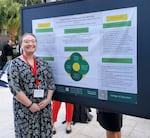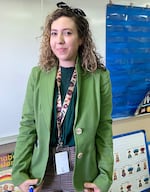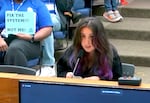As a kid, Alex Newson played “teacher,” lining up her toys as pretend students for lessons. She grew up wanting to teach special education, in part because she has family members who have disabilities.
“I’ve always been drawn to help those students because I often saw those were the students that were left out or not included in the ways that they should have been,” Newson said.
She also had strong teachers throughout her school career who showed her what it meant to be a good educator.

Alex Newson in Play-Doh form, created by an elementary student Newson taught. Newson left teaching in 2020 to start a doctoral program at the University of Oregon, where she’s working on a research project about autistic educators.
Courtesy of Alex Newson
Teaching special education in public and private schools around Eugene, Newson felt a connection with the autistic students she worked with. She understood when the lights in the classroom were too bright or when navigating the school social scene could get stressful for students. But she said her teaching experience was difficult. In 2020, she left the classroom. Around the same time, she learned she was autistic herself.
“While I was teaching, I was in such burnout spaces that I was unable to do very much,” Newson said. “When I was able to take a break and take care of myself, that’s when I started to seek out support … and in that process, figure out things about myself, which includes being autistic.”
Educators who are neurodivergent offer invaluable skills working in classrooms, especially when connecting with students receiving special education services. But the value of representation also comes at a cost for some — from struggling through unsupportive environments to leaving the profession altogether due to burnout.
After Newson left teaching, she enrolled in a doctoral program at the University of Oregon to learn how to better support students. She’s using her dissertation to explore the experiences of autistic educators like herself.
“I think autistic educators have immense talents that are overshadowed by the amount of burnout and ableism in spaces,” Newson said. She points to recent research findings that autistic teachers say they are able to advocate for and mentor neurodivergent students, as well as help create more spaces that are affirming for both neurodivergent and neurotypical students.
Students see themselves
Multiple studies and research papers have found students benefit from having teachers who look like themselves or have similar racial or ethnic identities. But there has been less research on the value of representation for students and school staff with disabilities.
First, there is no way of really knowing how many neurodivergent educators are teaching in classrooms. When it comes to “invisible” disabilities like autism or ADHD, not every educator discloses their disability to human resources or their school leaders. Others may self-diagnose or may not receive an official diagnosis until later in life. This is especially true for women and people of color.
In the U.S., an estimated 2.2% of adults have autism spectrum disorder and an estimated 4.4% of adults have ADHD. Neurodiversity is a broader term that covers both ADHD and ASD, along with other conditions. A 2020 study from the U.K. estimates that 15-20% of the world’s population is neurodivergent.

University of Oregon doctoral candidate Alex Newson presenting her research on the school to prison pipeline and neurodiversity at a conference. Newson, a formal special education teacher, is now a doctoral candidate in the UO special education and clinical sciences program.
Courtesy of Alex Newson
Most research on neurodivergent educators comes from outside of the U.S., but based on interviews OPB conducted, research findings from overseas reflect the experiences of neurodivergent educators working in schools across Oregon and Southwest Washington.
One study recounting the lived experience of autistic teachers found they bring strengths and face challenges in the classroom: strengths include the connections they can build with autistic students; challenges often stem from a lack of support and understanding from supervisors or colleagues.
Wynne Hurly teaches art at McLoughlin Middle School in Vancouver. Growing up, she was able to focus at home when there were no distractions but found it hard to understand what was going on at school.
“I’m trying to be the teacher that I needed as a student,” Hurly said.
@mshurlysart_tips More on present and respond! ✨🥰
♬ original sound - Ms. Hurly
Hurly said she was diagnosed with ADHD about six years ago and diagnosed herself with autism spectrum disorder. She said she is able to pay attention to students’ facial expressions, body language, and tone of voice, and that helps her know when to give students space and allow them to learn in a way that works for them.
“Now that I have this information, my job has become a lot easier and more fulfilling, and I feel like a lot of my students respond well when I talk openly about it,” she said.
Kathy Paxton-Williams is an English as a Second Language teacher in Portland. A longtime teacher, she was diagnosed with ADHD around 2015.
“I have a hard time being bored — that’s why I try not to be a boring teacher, I try to make it interesting, try to get kids to laugh,” she said.
Until last year, Bianca Cohen taught special education in Portland. She has autism and said she went into teaching to “reduce harm” for the next generation of students.
“I knew that learning can’t happen without establishing emotional safety and trust in my classroom. That was the undercurrent in every decision I made within my role as a special education professional,” she said.
The insight that neurodivergent teachers may have into students with a range of needs can also provide different strategies for balancing the needs of students with the whole classroom environment.
The first year Madeline Numbers had her own classroom, a third-grade general education class in Washington, one of her students had a special interest in the movie “Cars.” Throughout the year, the class would vote on party themes — the student pushed for a “Cars”-themed party, but other students thought they were “too old” for the movie.
Numbers said she talked to students about how their behavior might make the student feel. At the same time, she helped the student when he had difficulty regulating himself or his body. She offered the student fidget tools and a space in the classroom to go when feeling dysregulated.
At the end of the year, she saw progress from the student and his classmates. The student was better at self-regulating and knowing when to ask for help, and his classmates got better at accepting the student for who he was.
“The students all got together and decided they wanted to surprise him with a ‘Cars’ party … and were really engaging with him versus, I feel like at the beginning of the year, it had started off with an ‘othering’ experience, of, ‘that kid’s different.’”
Numbers focused on accessibility in her classroom — making sure that all students felt supported, even if they were at different places in their learning. She also focused on breaking down the reasons for a student’s behavior rather than approaching it as punitive.

Madeline Numbers, pictured here during the 2021 school year, is currently a substitute teacher working in the Evergreen Public Schools in Southwest Washington. Numbers said being a neurodivergent teacher allows her to help students learn how to advocate for themselves.
Courtesy of Madeline Numbers
“Helping kids really not feel shame in their actions and how they’re performing in the classroom, but really focusing on how to advocate for themselves,” Numbers said.
She sees her neurodivergence as a “huge strength” in the classroom, helping her connect and build strong relationships with both students and parents.
But rather than have a classroom full-time, Numbers decided this year to be a substitute teacher after she had negative experiences when trying to advocate for her own needs at school.
Seeking support — and burning out
At the first school where Numbers worked, she did not request formal accommodations, though it is an option for workers under the Americans with Disabilities Act. Accommodations are techniques or plans that employees or students can seek to help them succeed in their environment. Examples of student accommodations may include more time on an assignment or support from a specialist in reading or another subject. For an employee, an accommodation might mean working remotely or having a more flexible schedule — something that might be more challenging in education.
When Numbers went to work at a different elementary school, she sought support for short breaks throughout the day. But she said in reality, those accommodations weren’t met.
“There are a lot of things that make teaching challenging and it can be really hard,” she said. “But especially when you’re in an environment that doesn’t really seem to believe you or respect you when you’re advocating for your needs and the needs of your students, and it’s seen as a ‘nuisance.’”
At the same time, Numbers says she was burning out — another reason she decided to leave full-time teaching.
The COVID-19 pandemic brought the issue of burnout to the forefront of conversations about work in the last few years. But autistic burnout is different and can be more severe.
Numbers describes subbing as a sprint while teaching full-time as a marathon.
With subbing, “you’re just running to get through,” she said. “Teaching as a traditional classroom teacher is a marathon. You have to pace yourself.”
“The way my brain works, especially the ADHD-autism combination, is sometimes, the sprinting is easier because you can see the finish line sooner … The nice thing about subbing is at the end of the day, I leave, and I can leave my work behind.”
Liz Knapp, an educator in the McMinnville School District, got diagnosed with autism and ADHD about a year and a half ago, soon after her daughter did.
“I get to see the lens of how I am through her, and being able to understand how she doesn’t pick up on social cues or understand why some things are rude … I can see it in her, but I can’t see it in myself sometimes.”

Teacher Liz Knapp, center, works with students at Newby Elementary School in McMinnville, Dec. 12, 2023. Knapp was diagnosed with autism and ADHD about a year and a half ago, and says “…one of the things I have observed about being neurodivergent is that I am hyper aware of the othering that happens in education, and really try to work against that to support students.”
Kristyna Wentz-Graff / OPB
Knapp said she’s able to work with “complicated learners” to help them feel like part of a group instead of out on their own.
“Whether it’s behavior or lacking skills … one of the things I have observed about being neurodivergent is that I am hyper-aware of the othering that happens in education, and really try to work against that to support students,” she said.
Knapp said the only issues she’s had at work have been around communication with colleagues and administrators, something she’s thought more about since her diagnosis.
“As I think back on my employment, all the times I’ve been called to the carpet have been around this disability, and not because of my actual work performance,” Knapp said.
She recently decided to tell human resources about her diagnosis to start a conversation about accommodations. The district’s HR director said it was the first time an employee had used the term “neurodivergence” in seeking accommodations under the Americans with Disabilities Act.
Knapp isn’t sure what support she’s looking for from her employer but wanted to model self-advocacy for her daughter and potentially other colleagues who may want to disclose their diagnoses.
“I need to put myself out there and start advocating if I’m going to ask my daughter to do that,” Knapp said. “I have to go through it so that I have the words of advice to give to her when she’s in those situations because hiding and masking only goes so far.”
Not everyone discloses this information to their supervisor. Hurly, the art teacher in Vancouver, said her work environment is supportive. But she said she’d never officially share her ADHD diagnosis.
“I still feel like there would be an element of judgment and of lack because people don’t understand what the condition really is,’ Hurly said. “It’s classified as a disability when really it’s just a whole separate kind of brain structure and working system that doesn’t ‘fit’ with what we’re allowed to do.”
Like Numbers, Hurly experienced burnout, which pushed her to take time off last year.
For some neurodivergent educators, a short break is not enough time to overcome some of the challenges teaching brings.
Leaving the classroom permanently
At a Portland Public Schools board meeting last fall, Bianca Cohen announced her resignation from her position teaching special education.
“I am walking away from this profession not because I’ve given up on these students. I’m walking away from an environment that does not support neurodivergent humans, let alone any students,” Cohen said at the meeting.
Cohen shared this news during the meeting’s public comment period, where board members cannot respond but instead listen to concerns brought by students, parents, and staff. Cohen had worked in Portland elementary schools for eight years.

Former Portland Public Schools teacher Bianca Cohen shared a public comment at a board meeting on Oct. 25, 2022. In her comment, Cohen said she was resigning her position because the environment didn’t support neurodivergent staff or students.
Screenshot from video/YouTube
Cohen said in her role, she’d faced harassment, violation of accommodations she’d been granted under the Americans with Disabilities Act, as well as contract violations, like not getting a consistent lunch break.
In several emails to human resources, Cohen reported unwanted touching from her supervisor but said it did not stop. In October 2022, Cohen sent another message to HR to report unwanted touching. According to emails Cohen shared with OPB, she took responsibility for communication challenges with the supervisor but said that the unwanted touching made her feel disrespected. Cohen said in the email that she was considering resigning due to the environment.
Two days later, Cohen received an email from her supervisor stating there were “concerns about student safety, classroom management, and the level of academic challenge for students.”
Later that month, she had a staffer observe her classroom as part of an evaluation resulting from the supervisor’s concerns. Cohen said an incident happened during that observation that left her feeling unsafe and unsupported.
“I was grabbed by a student by my hair,” Cohen recalled. She said she was unable to break free as other students jumped in to try to help.
The whole incident lasted five minutes until a paraeducator came back into the classroom and helped Cohen. But she said the staffer observing her classroom did nothing while Cohen struggled.
“If I saw someone being attacked, I would do something about it, because it’s the right thing to do,” she said. “This inaction, it really resonated with me, and it sent a message that finally came to a head: no matter where I turn to for support and help, it would be aimless.”
Cohen resigned, partly due to advice from her doctors that being in the classroom was “unsustainable” for her health.
She filed complaints with multiple state agencies, including the Oregon Department of Education, Bureau of Labor and Industries, and the Oregon Health Authority. She also filed with the federal Equal Employment Opportunity Commission, alleging that she was discriminated against due to her disability.
PPS officials said they cannot comment on personnel matters but said they dispute several allegations in Cohen’s complaints filed with ODE and BOLI. PPS says it accommodates staff disabilities.
Cohen has since found another job outside of the education field, but she still considers herself a teacher.
“Autistics like me are not a liability or a burden. We are necessary, we’re an asset to innovation,” she said. “Support and celebrate us authentically to do that.”
So, how can workplaces do that?
What neurodivergent educators — and their supervisors — can do
In addition to being an associate professor at Portland State University’s School of Social Work, Dora Raymaker is a co-director for Academic Autism Partnership in Research and Education, doing research about and for the autistic community.
One of Raymaker’s recent studies looked at autism and skilled employment, specifically seeking out autistic employees who had positive work experiences. The idea came from wanting to know more about what makes a workplace successful from the employee’s perspective.
“I also wanted autistic people to define for themselves what success meant,” Raymaker said.
The paper, published in the journal Autism in 2022, includes responses from 45 autistic people who are employed or seeking employment in skilled trades including education, science and law.
Through those interviews, Raymaker found common examples of what made employment successful for autistic people — from supportive bosses and direct communication to flexible hiring and a workplace culture “that allowed them to be openly autistic.”
“Professional growth, good work-life balance, financial independence, a sense of community in the workplace, feeling valued, having meaningful work, being accepted, being in an accommodating environment, these are things that the general population also feels is successful work,” Raymaker said.
“I am not surprised but I wish that more people realize that we’re people and we have kind of the same needs around work as anybody does.”
Raymaker and their colleagues also found that disclosing autism resulted in both positive and negative outcomes for those interviewed and that many of those interviewed had “unconventional pathways” to their jobs.

Kindergarten student Abigail Lemus Guerrero, left, gets a high-five from teacher Liz Knapp, during class at Newby Elementary School in McMinnville, Dec. 12, 2023.
Kristyna Wentz-Graff / OPB
Many of the subjects interviewed for Raymaker’s paper shared experiences with discrimination, ableism, and the negative mental health effects of being in an unsupportive environment.
The supervisors Raymaker talked to suggested trauma-informed approaches to working with people while also mentoring and fostering good relationships with employees.
In addition to accommodations like breaks or asking for feedback, neurodivergent educators OPB spoke to recommended more collaboration in their workplace and classroom. They suggested perhaps working with other teachers and, in some cases, even a special education teacher and a general education teacher co-teaching in a shared classroom.
“We talk about differentiating for students, and I wish we would similarly differentiate for adults,” Paxton-Williams, the Portland ESL teacher, said.
For supervisors in education — like principals and superintendents — supporting neurodivergent employees isn’t a part of their training yet. In Lewis & Clark’s graduate school leadership studies program, there is course content specific to neurodivergent students. Mollie Galloway, associate professor and chair of teaching, school counseling, and leadership studies in the Graduate School of Education and Counseling, says while there are conversations happening about educators who are neurodivergent, there isn’t specific content or training on that topic yet.
“What I think we need, both in our own programs and in the field of educational leadership more broadly, are more formal learning opportunities for leadership candidates to support neurodivergent educators and what they bring to schools,” Galloway said in an email to OPB.
Newson, the University of Oregon doctoral candidate, wants to turn her dissertation on autistic educator burnout into usable recommendations she hopes will offer tools to mitigate burnout and instead promote “autistic flourishing.”
She said neurodivergent educators are needed in the classroom, but not at the expense of one’s health.
“I don’t want to ask autistic educators to come into this space when the space is not ready for them,” Newson said. “We need to think as an education community, ‘What are we doing to make spaces safe for autistic and neurodivergent educators?’ Because most of these spaces are not safe and not welcoming.
“I would say, ‘We need you. Your talent, skills, and abilities are fantastic and amazing and needed. However, please take care of yourself.’”